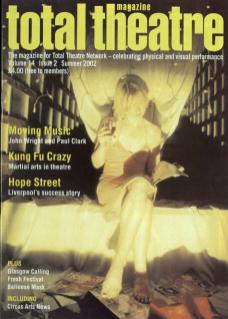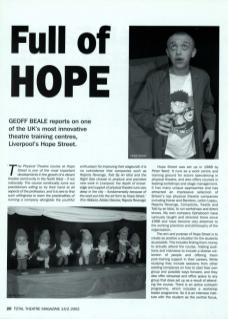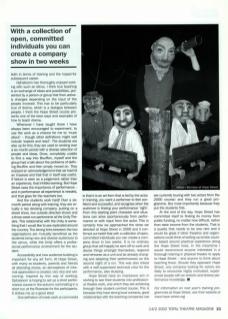‘The Physical Theatre course at Hope Street is one of the most important developments in the growth of a vibrant theatre community in the North West – if not nationally. The course continually turns out practitioners willing to try their hand at all aspects of the profession, and it is rare to find such willingness to learn the practicalities of running a company alongside the youthful enthusiasm for improving their stagecraft. It is no coincidence that companies such as Rejects Revenge, Told By An Idiot and the Right Size choose to produce and premiere new work in Liverpool; the depth of knowledge and support of physical theatre runs very deep in the city – fundamentally because of the work put into the artform by Hope Street.’ (Tim Hibberd, Artistic Director, Rejects Revenge)
Hope Street was set up in 1988 by Peter Ward. It runs as a work centre and training ground for actors specialising in physical theatre, and also offers courses in leading workshops and stage management. It has many unique approaches and has attracted an impressive selection of Britain's top physical theatre companies including Horse and Bamboo, Leikin Loppu, Rejects Revenge, Complicite, Trestle and Told by an Idiot, to run workshops and direct shows. My own company Ophaboom have variously taught and directed there since 1996 and have become very attached to the working practices and philosophy of the organisation.
The aim and purpose of Hope Street is to create as positive a situation for the students as possible. This includes finding them money to actually attend the course, holding auditions and interviews to include a diverse collection of people, and offering them post-training support in their careers. While studying they include sessions from other existing companies on how to start their own group and possible ways forward, and they also offer rehearsal and office space to any group that does set up as a result of attending the course. There is an active outreach programme, which includes a workshop leader programme. So it is an intensive institute with the student as the central focus, both in terms of training and the hoped-for subsequent career.
Ophaboom has thoroughly enjoyed working with such an ethos. I think true teaching is an exchange of ideas and possibilities, presented by a person or group that then actively changes depending on the input of the people involved. This has to be particularly true of drama, which is a dialogue between people. I think the Hope Street course presents one of the best ways and examples of how to teach drama.
Whenever have taught there I have always been encouraged to experiment, to use the work as a chance for me to 'muck about' – though other definitions might well include 'explore and react'. The students are also up for this, they are used to working over a six-month period with a diverse selection of people and ideas. Once, completely unable to find a way into Bouffon, myself and the group had a talk about the problems of defining Bouffon and then simply moved on. They enjoyed an acknowledgement that we had hit an impasse and that that in itself was useful. If failure is seen as a judgement rather than an experience, that inhibits learning. But Hope Street sees the importance of performance – and in performance all experience is needed, and that goes for the teachers too.
With a collection of open, committed individuals you can create a company show in two weeks
And the students work hard! Over a six-month period along with training, they are virtually a rep devising company, putting on a street show, two outside directed shows and a three-week-run pantomime at the Unity Theatre. This relationship with the Unity is something that I would like to see replicated around the country. The strong links between the two organisations are mutually beneficial as the students bring new and diverse audiences to the venue, while the Unity offers a professional performance environment for the student.
Accessibility and new audience building is important for any artform. At Hope Street, with many ex-students, parents and friends all attending shows, an atmosphere of informal appreciation is created, very nice and welcoming. Inspired by this way of working, Ophaboom is hoping to set up a short performance course in the autumn culminating in a short run at the Riverside for the participants. It strikes me as a good idea!
One definition of mask work or commedia is that it is an artform that is led by the actor. In training, you want a performer to feel confident and successful, and recognise when the audience is finding your performance 'right'. From this starting point character and situations can arise spontaneously from performance or with input from the actor. This is certainly how we approached the show we directed at Hope Street in 2000 and it confirmed our belief that with a collection of open, committed individuals you can create a company show in two weeks. It is no ordinary group that will happily be sent off to work and devise things amongst themselves, respond and rehearse as a unit and be already changing and adapting their performances on the second night of a run. This was also linked with a well-supervised technical crew for the performance, also studying.
Hope Street have an impressive aim in wishing to see their students into professional theatre work, one which they are achieving through their student-centred course. This is because they have strong local contacts, good relationships with the teaching companies (we are currently touring with two actors from the 2000 course) and they run a good programme. But most importantly because they put the students first.
At the end of the day, Hope Street has committed itself to finding its money from public funding, no matter how difficult, rather than raise income from the students. That is a quality that needs to be less rare and it would be great if other theatres and organisations could think of setting up similar courses based around practical experience along the Hope Street lines. In the meantime I would recommend anyone interested in a thorough training in physical theatre to apply to Hope Street – and anyone to think about teaching there. Should they approach Hope Street, any company looking for actors are likely to encounter highly motivated, experienced people with an eclectic and diverse performance knowledge.
For information on next year's training programmes at Hope Street, see their website at www.hope-street.org


